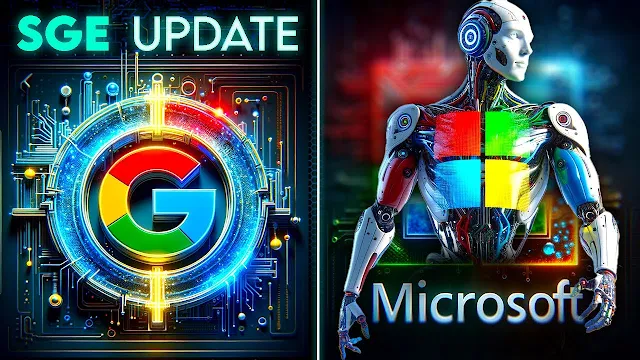
Google's Search Generative Experience (SGE) Evolves with New Features
In the ever-evolving landscape of search technology, Google has recently enhanced its Search Generative Experience (SGE) with a suite of new features and expanded global availability. SGE, a powerful AI-driven tool, aims to revolutionize the way we access and comprehend information online.
AI-Powered Summaries and Overviews
One of the standout features of SGE is its ability to generate AI-powered summaries and overviews. By analyzing a vast array of information from various sources, SGE can distill complex topics into clear and concise summaries, making it easier for users to grasp the key insights. This feature is particularly valuable when dealing with intricate questions or subjects that require a multifaceted understanding.
Conversational Search Experience
Another significant improvement in SGE is the enhanced ability to ask follow-up questions seamlessly. Rather than starting a new search every time a user has an additional query, SGE now allows them to type these questions directly into the search results page. This conversational search experience creates a more natural and efficient information-gathering process, fostering a sense of dialogue between the user and the search engine.
Improved Translation Capabilities
Google has also made strides in enhancing its translation services within SGE. When translating a sentence that contains words with multiple meanings, SGE now highlights those ambiguous terms, allowing users to select the appropriate meaning for their context. This feature, initially available for translations from English to Spanish in the US, is set to expand to more languages and regions in the near future.
Global Expansion and Language Support
Alongside the feature updates, Google has also expanded the availability of SGE to over 120 new countries and territories, and has added four new languages: Spanish, Portuguese, Korean, and Indonesian. This global expansion ensures that users around the world can now access the benefits of SGE, regardless of their location or language preference.
Specialized Enhancements
To further enhance the user experience, Google has also introduced interactive definitions for specific search topics, such as coding and health-related queries. When users encounter key terms in these domains, SGE will highlight them, allowing users to hover over and view the definitions, along with relevant visuals.
These advancements in SGE are part of Google's broader strategy to make information more accessible, understandable, and tailored to the needs of its users. By leveraging the power of AI, Google aims to transform the search experience, empowering individuals to navigate the vast ocean of online information with greater ease and efficiency.
Addressing Common Misconceptions about AI
As AI continues to permeate various aspects of our lives, it is essential to address the common misconceptions that often surround this transformative technology. Carmel Allison, a Microsoft AI expert, sheds light on four prevalent misunderstandings about artificial intelligence.
AI and Job Displacement
Misconception: AI will eliminate jobs and lead to widespread unemployment.
Allison's Perspective: Allison clarifies that AI is not about eliminating jobs, but rather transforming them. AI automates routine tasks, freeing people to engage in more creative and meaningful activities. This shift in job nature requires a rethinking of our work approach and the integration of AI, rather than a complete displacement of human labor.
AI as a Niche for Tech Experts
Misconception: AI is only accessible to technology experts and professionals.
Allison's Perspective: Allison dispels this notion, highlighting that AI is already integrated into many of our daily activities, such as using search engines, online shopping, and email applications. She emphasizes that AI is becoming increasingly accessible to everyone, not just tech experts, and its impact is particularly significant in healthcare, where it assists doctors and enhances patient care.
AI as a Singular Technology
Misconception: AI is a single, monolithic technology.
Allison's Perspective: Allison clarifies that AI is not a singular technology, but rather a blend of various technologies embedded in common tools and applications. Understanding the range of AI tools and choosing the right one for each task is essential to effectively leverage this transformative technology.
AI and Inherent Bias
Misconception: AI systems are inherently biased and cannot be trusted.
Allison's Perspective: Allison acknowledges the potential for bias in AI systems, but emphasizes the importance of using AI as informed users. She advocates for the use of diverse data sets and unbiased algorithms in AI development, practices that Microsoft follows in its commitment to responsible AI. By understanding how AI systems are developed and the principles of the companies that create them, users can make informed decisions and harness the power of AI while mitigating the risks of bias.
Allison's overarching message is the importance of comprehending AI's complexities and capabilities to make the most of this transformative technology in our lives. By addressing these common misconceptions, she empowers individuals to approach AI with a deeper understanding, enabling them to unlock its true potential and integrate it seamlessly into their daily routines and professional endeavors.





.jpg)


0 Comments